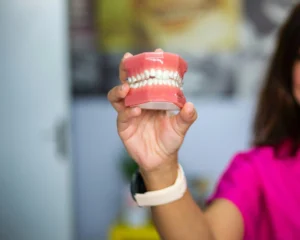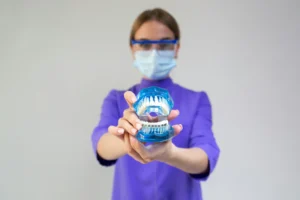Dentures are classified as removable dental prosthetic appliances used to replace missing teeth dental bridges and the associated structures. These appliances can be made to be fixed in the upper arch, the lower arch, or both by the requirements of the patient. Dentures are usually made of different materials like acrylic, resin, nylon, metal, and porcelain so that the dentures would be strong and aesthetically pleasing.
To avoid slippage, patients who wear dentures often apply some form of sticky paste known as dental cement. The use of a denture brush and denture cleaner is recommended for daily cleaning to ensure oral hygiene and fresh breath. It is important to clean the dentures daily and also visit the dentist regularly from time to time for examinations as the mouth continues to change with time.
Types of Dentures
There are different types of dentures based on the requirements of an individual for the substitution of lost teeth and overall oral condition.
Complete Dentures (Full Dentures):
Full dentures are those that are employed to replace all the natural teeth in either the mandibular or maxillary arch. They are specially designed to closely embrace the abutments, and sit on the gums and the underlying alveolar bone. Complete dentures enable effective chewing and speaking and also improve aesthetics by maintaining the shape of the face due to the support given to the cheeks and lips.
Partial Dentures:
The partial dentures are used to replace a few missing teeth and are fixed on the remaining natural teeth. Sometimes, they employ a metallic base or clips that help in the attachment of the complete denture. These not only help to replace the missing teeth but also prevent the movement of the neighboring teeth. This type of denture is specifically suitable for individuals who still possess some healthy natural teeth.
Immediate Dentures:
Immediate dentures are made after the teeth have been extracted and it takes some time for the gums to heal before one can wear the permanent dentures. This makes it possible for the patients to do without the teeth during the time of healing.
Implant-Supported Dentures:
As opposed to conventional dentures, implant-supported dentures provide more support and feel more like natural teeth by attaching the denture to the implants. These are the metallic screws that are inserted into the jaw bones to act as anchors. Such types are especially useful for those patients who have had severe bone loss in the jaw, as implants stimulate bone growth and promote the preservation of bone tissue.
Key Features and Benefits of Each Type:
- Complete Dentures:
- Replace all teeth in the upper or lower jaw.
- Enhance chewing and speaking abilities.
- Improve facial appearance and support soft tissues.
- Partial Dentures:
- Replace a few missing teeth.
- Attached to remaining natural teeth with a metal framework.
- Prevent adjacent teeth from shifting.
- Immediate Dentures:
- Placed immediately after tooth extraction.
- Provide an immediate solution during the healing period.
- May require adjustments as the gums heal.
- Implant-Supported Dentures:
- Anchored by dental implants for added stability.
- Provide a closer feel to natural teeth.
- Help preserve the underlying bone by stimulating the jawbone.
Benefits of Dentures
Full or partial dentures provide many advantages, most importantly improving the patient’s quality of life in case of a serious condition. Here’s a detailed look at how they can improve various aspects of oral health and overall well-being:
Restoring Appearance and Oral Functions:
Complete and removable partial denture gives back one’s smile by replacing lost teeth and muscle attachment. They assist in color, giving a youthful appearance, and also function in bite as well as speech functions.
Improving Chewing and Speaking Abilities:
With real teeth removed, dentures help to chew well. They also help in the correction of acoustic phonetics thus enabling proper functioning of voice communication.
Boosting Confidence and Self-Esteem:
Prosthetic teeth help to restore the individuals’ smile, and they can interact with other people without any concern as their self-esteem will have improved.
Preventing Further Tooth Loss and Gum Disease:
For those with missing teeth, wearing dentures can ensure that there is no more deterioration of teeth or gum tissue since they provide cover to the gums to prevent them from coming in contact with food particles and bacteria that cause further deterioration. Maintenance involves a proper cleaning and a checkup with a dentist helps its durability and the health of the mouth.
Denture Materials and Construction
Dentures, also known as dental plates, are made from a range of materials that are selected depending on the case of an individual to offer the best kind of support and shape.
Materials Used in Dentures:
Currently, they can be made from the following materials: acrylic, resin, nylon metal, and porcelain.
Acrylic and Resin: These materials are often incorporated into the construction of the denture base since they are light and can be easily modeled. They can look like real gumbo, and it is possible to have them come out in a natural color that is close to the gum color.
Nylon: This material is quite elastic and imparted to some sort of partial dentures to be more comfortable when worn.
Metal: Cobalt chromium with metal frameworks gives partial dentures stability and these are a strong and long-lasting material.
Porcelain: Porcelain is preferred for denture teeth due to its resemblance to natural teeth and how they can be manipulated. It has a close resemblance in color and shape to normal dental tissues and it performs the characteristic functions of normal teeth.
Construction of Dentures:
The process of creating new dentures is not only the modeling and creation of the base but several other steps as well.
Initial Assessment and Impressions: The dentist molds the gum tissue, along with the remaining teeth, to make an accurate impression that will serve the fabrication of the prosthetic. This is important to achieve the precise positioning and contours for the final denture.
Denture Base Creation: The dentist prepares the body of the denture from acrylic or resin to rest on the gum and alveolar ridge. This base will support the artificial teeth.
Designing Artificial Teeth: The design of the artificial teeth replaces missing teeth and mimics the appearance and function of natural teeth. We carefully align them to replicate the patient’s bite and facial structure, ensuring a natural aesthetic and efficient chewing.
Assembling the Denture: After preparing the base for the full denture and the artificial teeth, the dentist positions them. For standard dentures, the dentist inserts the teeth directly into the acrylic or resin base material. For partial dentures, the dentist uses metal in the framework to support the them on the remaining teeth.
How Dentures are Made
Denture fabrication involves both the dentist and a dental technician, who works at a full dental lab laboratory. Here’s a concise overview:
Taking Impressions:
The dentist records the dimensions of the patient’s oral tissues to capture the natural contours of his or her gums and upper jaw-line.
Creating Models:
The dentist sends these impressions to a dental laboratory where skilled technicians create precise replicas of the patient’s mouth, which serve as the map for the dentures.
Dental Visit:
When the denture is ready and fitted, the patient has to visit the dentist for the first month to check on the alignment, fit, and comfort as well as functionality.
Denture Care and Maintenance
To prevent damage or the need for early replacement, patients must care for and maintain their dentures regularly. Here’s a concise guide on how to take care of your dentures:
Cleaning Dentures:
Daily Cleaning: Dentures can be cleaned using a soft toothbrush and mild soap and this should be done daily.
Soaking Overnight: Clean dentures in warm water. You can also mix water with vinegar for cleaning. Soak dentures in water to keep them moist and avoid placing them in the refrigerator, as this can make them brittle.
Denture Adhesive:
Enhancing Stability: A denture adhesive can enhance retention and stability, but it is not a solution to correct a poorly fitting denture.
Proper Use: Put a small amount of the glue you will be using on the surfaces and ensure that you follow the manufacturer’s instructions.
Consult a Dentist: A patient should always consult a dentist when they want to make use of a denture adhesive.
Storage:
Proper Storage: Place dentures in a glass of water or cleaner to retain their shape whenever you are not wearing them.
If you follow these tips, your dentures will stay in good condition allowing you to have a solution for your missing teeth dentures that is comfortable as well as effective.
FAQ’s
Are dentures better than implants?
While dentures may be more affordable than implants they do not resolve a jaw fracture. When you find the missing tooth, your body absorbs the minerals from your jaws to use elsewhere. Once the situation has been reversed, bone tissues deteriorate.
How long do denture teeth last?
Your dentures will to last several months with a proper cleaning routine. Nevertheless, certain situations can justify replacing dentures. Dentures of older age are generally considered replacements.
Transform Your Smile with Custom Dentures from Ideal Smiles of Stamford
At Ideal Smiles of Stamford, we’re passionate about helping you achieve a confident and comfortable smile with our tailor-made dentures. Our skilled professionals use advanced technology and high-quality materials to ensure your dentures offer a perfect fit and a natural look. Discover the difference with personalized denture solutions that enhance both function and aesthetics—schedule your appointment with Ideal Smiles of Stamford today!
Conclusion
Partial or complete dentures are quite common in the prosthodontics field where people with lost teeth need replacement. Traditional removable dentures may need replacement after some years if they are well taken care of. In summary, full and partial denture wear can enhance the quality of life and self-esteem of individuals.






